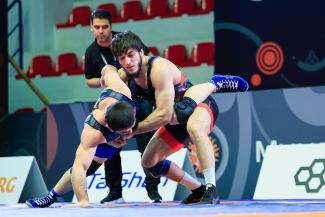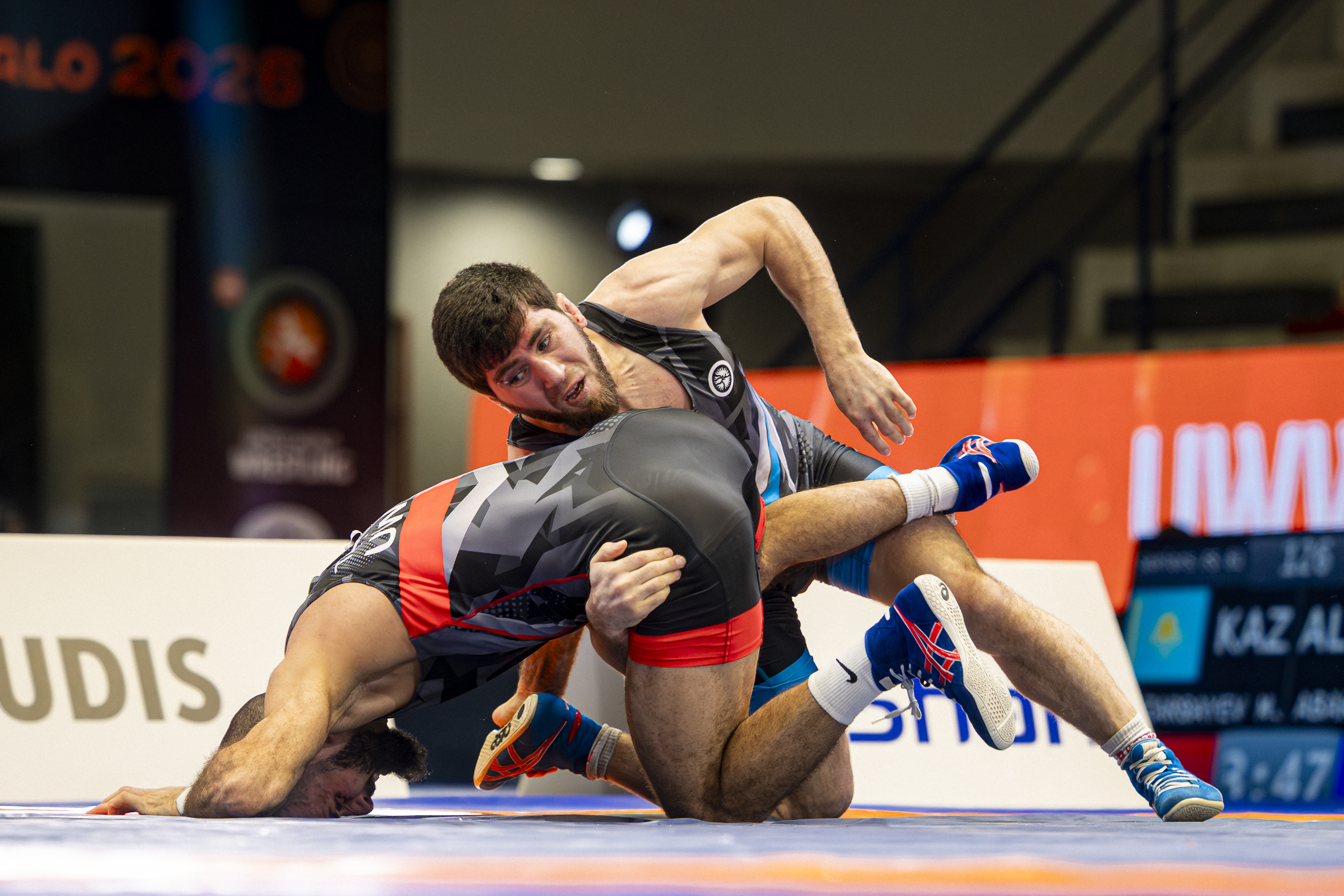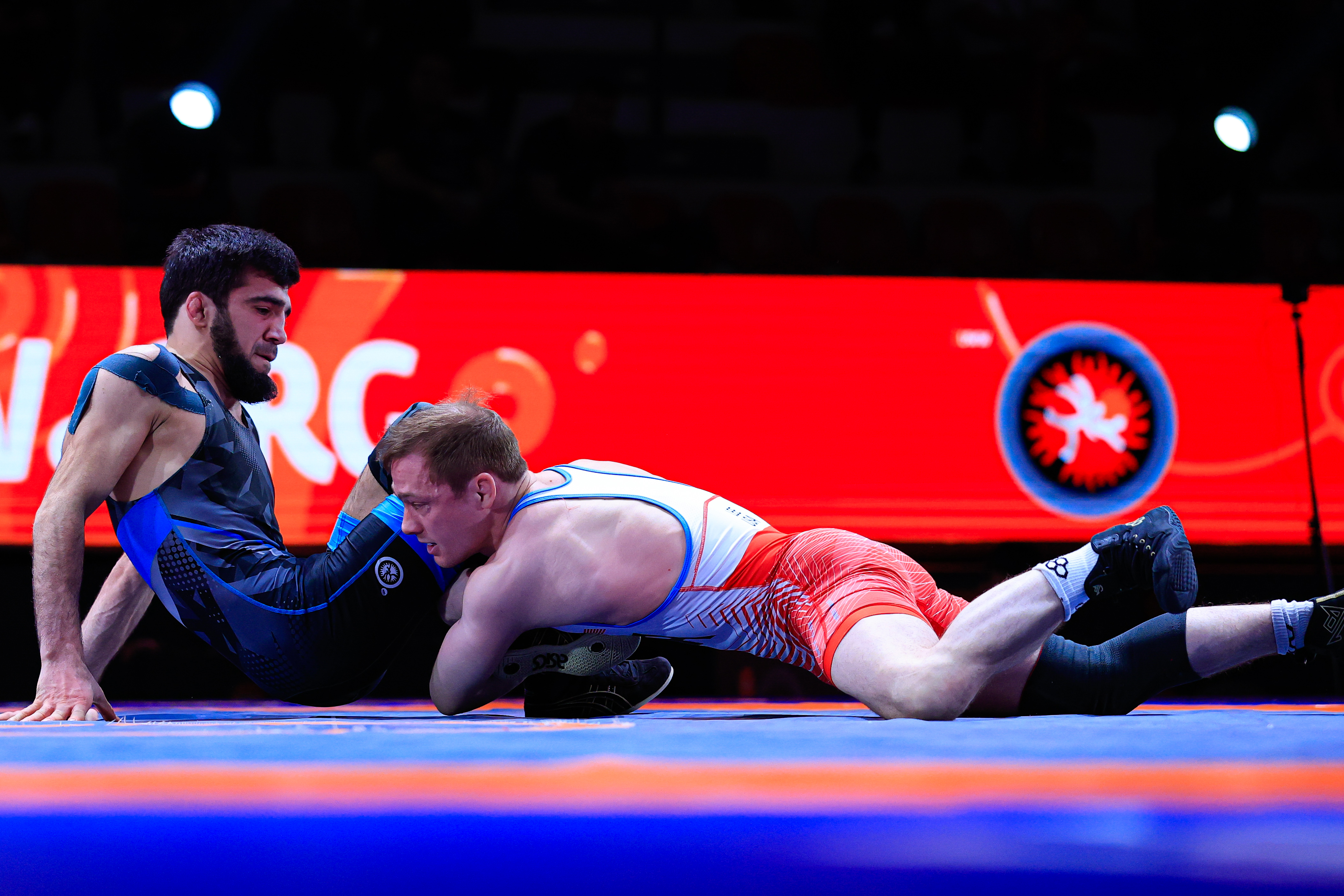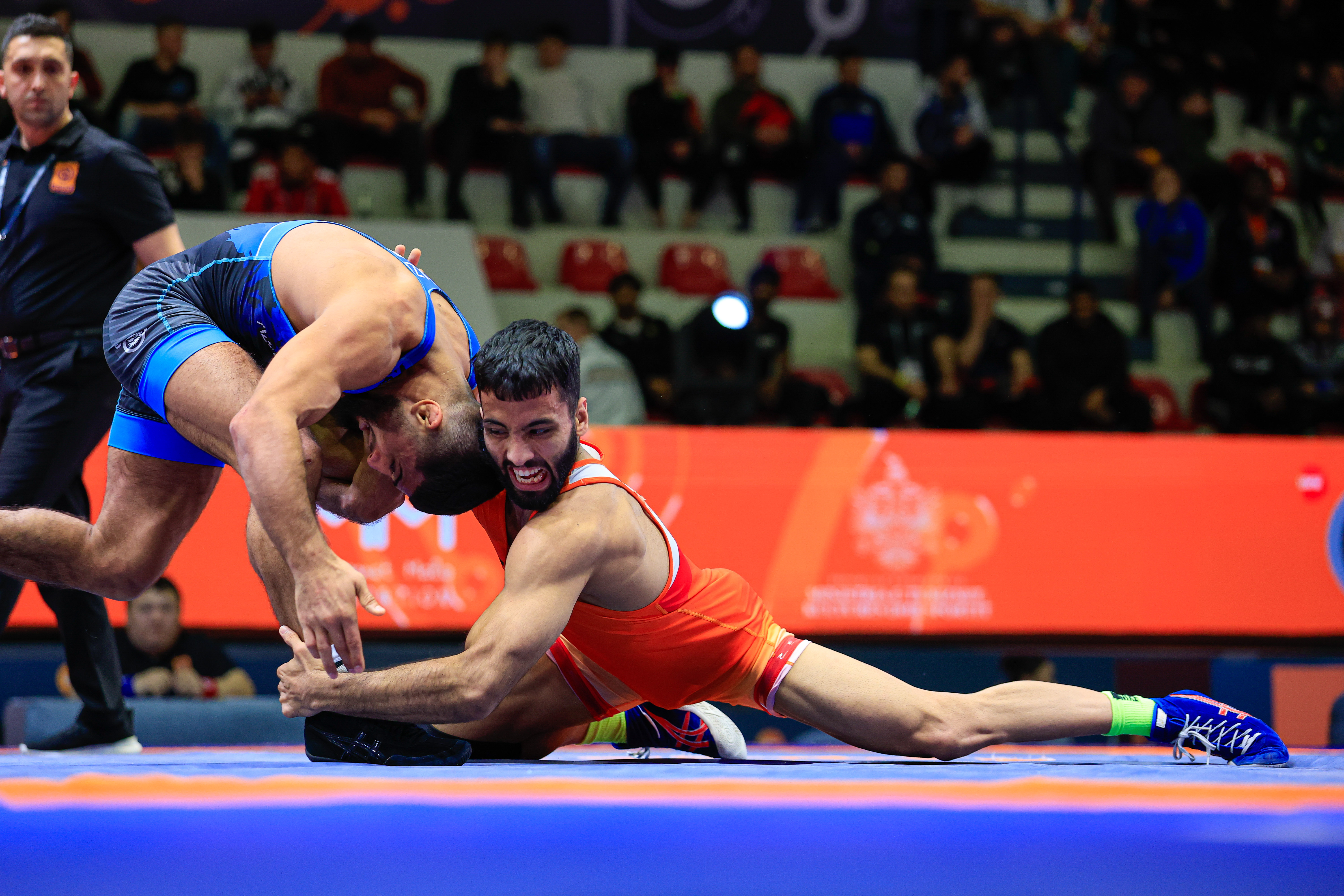European Championships to witness Akgul vs Petraishvili again
Tuesday, April 18, 2023 - 17:30 By Vinay Siwach

ZAGREB, Croatia (April 18) -- Taha AKGUL (TUR) and Geno PETRIASHVILI (GEO) will have a go at each other once again after the two made it to the final for the second year in a row. Last year, Akgul defeated Petriashvili to win the gold and the latter will have a chance to avenge that loss.
After easy pickings in the quarterfinals, both wrestlers had comfortable wins in the semifinals as well. Akgul defeated Abraham CONYEDO (ITA) 4-0 while Petriashvili picked up a 7-4 win over Daniel LIGETI (HUN). Petriashvili gave up a huge four-pointer in that semifinal.
Akgul leads Petriashvili 5-1 in their European head-to-head record and Wednesday will see if Petriashvili can pull one back.
Another rematch from 2022 will be at 74kg as Tajmuraz SALKAZANOV (SVK) and Frank CHAMIZO (ITA) returned to the final in Zagreb. Salkazanov won the thriller in Budapest last year.
The defending champion once again used his defensive skills to outplay his opponents in the morning session. He defeated Rasul SHAPIEV (MKD) 5-0 and Hrayr ALIKHANYAN (ARM) 3-0 before facing Avantdil KENTCHADZE (GEO) in the semifinal. Salkazanov did not change his strategy and managed to see off the Georgian to win 5-1.
Chamizo had a much tougher road to the final as he faced Dzhabrail GADZHIEV (AZE) in the opening bout. Gadzhiev had the lead but Chamizo's activity broke the U20 world champion and he lost 9-4. Soner DEMIRTAS (TUR) must have thought he is in a safe area leading 6-1 against Chamizo in the quarterfinal. But Chamizo worked his way to three takedowns and a stepout to win 8-6. In the semifinal, he defeated Ali UMARPASHAEV (BUL) 9-0 before the Bulgarian was injured.
"Last year I was not myself," Chamizo said. "This year I am going to focus a little bit more and let's see what happens."
On his final against Salkazanov, Chamizo said he doesn't like the match-up against Salkazanov as he operates with a completely different style.
"He always beats me," he said. "I don't know why. I don't like wrestling him may be because he doesn't really wrestle. But I am ready. I am not worried about who loses or wins. I am a competitor."
At 61kg, world champion Zelimkhan ABAKAROV (ALB) reached his first European Championships final in a mixed performance. He began with an 11-0 win over Niklas STECHELE (GER) and denied Taras MARKOVYCH (UKR) 6-2 in the quarterfinals.
However, the semifinal proved to be a scare as Shota PHARTENADZE (GEO) got four points in the first period. Phartenadze shot for the ankle and got the takedown before adding a back exposure. But Abakarov pulled out a stunning single leg to score two points just before the break. Albania challenged the call and asked for four. On review, it was confirmed that Phartenadze fell on his back from standing and Albania won the challenge to lead 4-4 on criteria.
The second period saw him engage Phartenadze enough to not be called passive but there were no more points in those three points. He moved into the final, only the second Albanian wrestler ever.
He will now face defending champion Arsen HARUTYUNYAN (ARM) who easily moved into the final after beating Arman ELOYAN (FRA) 10-0 in the semifinal.
Another defending champion who moved into the final was Myles AMINE (SMR) at 86kg. He had to dig deep in the semifinal against Sebastian JEZIERZANSKI (POL) as he was trailing 2-1. But an arm-drag with two seconds remaining gave him the takedown and a 3-2 win.
He will now face Dauren KURUGLIEV (GRE), who won the European Championships in 2017 for Russian Wrestling Federation. He defeated Boris MAKOEV (SVK) 5-0 in the semifinal to make his second Euro final.
After three finalists on day one, Azerbaijan added one more on Tuesday as Osman NURMAGOMEDOV (AZE) reached his first-ever final at the European Championships after two bronze medals. In the semifinal, he defeated Ermak KARDANOV (SVK) 6-0.
It could have been another world bronze medalist in the final but Feyzullah AKTURK (TUR) beat Miriani MAISURADZE (GEO) 11-1 in the other semifinal to deny that. He will be looking to defend his title which he won in Budapest.
RESULTS
Semifinals
61kg
GOLD: Arsen HARUTYUNYAN (ARM) vs. Zelimkhan ABAKAROV (ALB)
SF 1: Arsen HARUTYUNYAN (ARM) df. Arman ELOYAN (FRA), 10-0
SF 2: Zelimkhan ABAKAROV (ALB) df. Shota PHARTENADZE (GEO), 4-4
74kg
GOLD: Taimuraz SALKAZANOV (SVK) vs. Frank CHAMIZO (ITA)
SF 1: Taimuraz SALKAZANOV (SVK) df. Avtandil KENTCHADZE (GEO), 5-1
SF 2: Frank CHAMIZO (ITA) df. Ali UMARPASHAEV (BUL), 9-0 via injury default
86kg
GOLD: Dauren KURUGLIEV (GRE) vs. Myles AMINE (SMR)
SF 1: Myles AMINE (SMR) df. Sebastian JEZIERZANSKI (POL), 3-2
SF 2: Dauren KURUGLIEV (GRE) df. Boris MAKOEV (SVK), 5-0
92kg
GOLD: Feyzullah AKTURK (TUR) vs. Osman NURMAGOMEDOV (AZE)
SF 1: Feyzullah AKTURK (TUR) df. Miriani MAISURADZE (GEO), 11-1
SF 2: Osman NURMAGOMEDOV (AZE) df. Ermak KARDANOV (SVK), 6-0
125kg
GOLD: Taha AKGUL (TUR) vs. Geno PETRIASHVILI (GEO)
SF 1: Taha AKGUL (TUR) df. Abraham CONYEDO (ITA), 4-0
SF 2: Geno PETRIASHVILI (GEO) df. Daniel LIGETI (HUN), 7-4


 Zavur UGUEV (UWW) scores a takedown on Chermen TAVITOV (UWW) in the 61kg final. (Photo: United World Wrestling / Kadir Caliskan)
Zavur UGUEV (UWW) scores a takedown on Chermen TAVITOV (UWW) in the 61kg final. (Photo: United World Wrestling / Kadir Caliskan) Spencer LEE (USA) scores a turn on Ramiz GAMZATOV (UWW) during the 57kg final. (Photo: United World Wrestling / Kostadin Andonov)
Spencer LEE (USA) scores a turn on Ramiz GAMZATOV (UWW) during the 57kg final. (Photo: United World Wrestling / Kostadin Andonov) SUJEET (IND) completes an attack against Rashid BABAZADE (AZE) during the 65kg final. (Photo: United World Wrestling / Kostadin Andonov)
SUJEET (IND) completes an attack against Rashid BABAZADE (AZE) during the 65kg final. (Photo: United World Wrestling / Kostadin Andonov)
Share your thoughts.
Comments